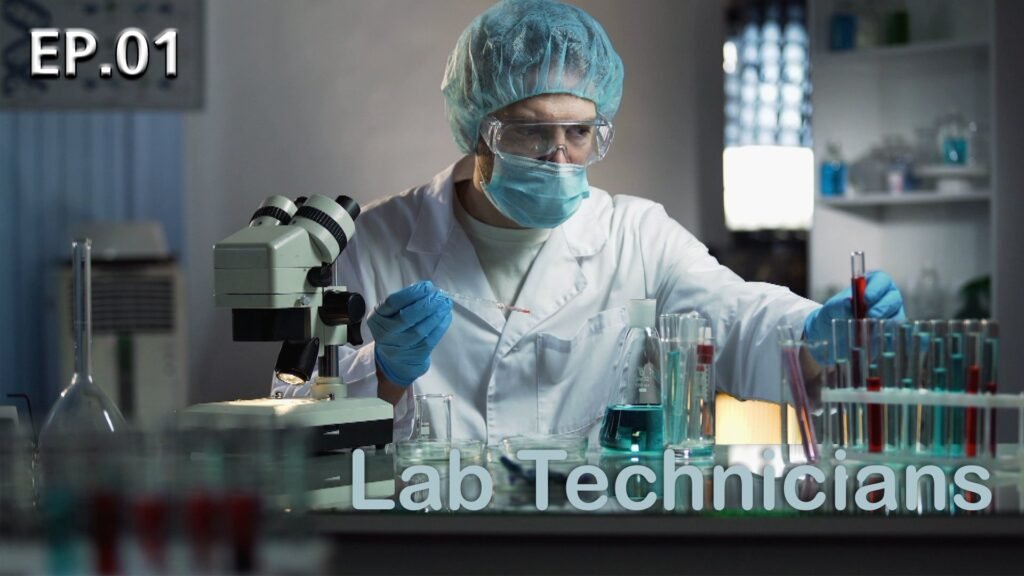What is a Lab Technician?
A lab technician, also known as a medical laboratory technician or clinical laboratory technician, is a professional who performs various laboratory tests and analyses on biological samples, such as blood, urine, and tissue specimens. Their primary role is to assist physicians, scientists, and researchers in diagnosing and monitoring diseases, as well as conducting scientific experiments and research studies.
Lab technicians are responsible for collecting and preparing samples, operating and maintaining laboratory equipment, performing tests and analyses, recording and interpreting data, and ensuring the accuracy and quality of test results. They work closely with other healthcare professionals, including physicians, nurses, and laboratory scientists, to provide crucial information for diagnosis, treatment, and research purposes.
There are several types of lab technicians, each specializing in different areas of laboratory work. Some common types include:
-
Medical Laboratory Technicians: These professionals work in hospitals, clinics, and medical laboratories, performing tests on patient samples to detect diseases, monitor treatment effectiveness, and assist in diagnosing medical conditions.
-
Biotechnology Technicians: They work in biotechnology companies, research institutions, and pharmaceutical laboratories, conducting experiments and analyses related to genetic engineering, cloning, and the development of new drugs and therapies.
-
Environmental Technicians: These technicians work in environmental laboratories, testing air, water, soil, and other samples for pollutants, contaminants, and environmental hazards.
-
Forensic Technicians: They work in crime laboratories, analyzing evidence such as blood, hair, and fiber samples to assist in criminal investigations and legal proceedings.
Regardless of their specialization, lab technicians play a vital role in various fields, including healthcare, research, environmental protection, and law enforcement, contributing to the advancement of scientific knowledge and the well-being of society.
Educational Requirements
To become a lab technician, individuals typically need to obtain at least an associate’s degree in medical laboratory technology, clinical laboratory science, or a related field. These programs typically take two years to complete and provide a combination of classroom instruction and hands-on laboratory training.
Many employers prefer to hire lab technicians who have earned a bachelor’s degree in medical technology, clinical laboratory science, or a life science field such as biology or chemistry. These four-year programs provide more in-depth training and prepare students for advanced roles or further education.
In addition to formal education, lab technicians must obtain certification from recognized organizations such as the American Society for Clinical Pathology (ASCP) or the American Medical Technologists (AMT). Certification typically requires passing an exam and meeting specific educational and clinical experience requirements.
Some lab technicians may also choose to pursue specialized certifications in areas such as phlebotomy, histology, or molecular diagnostics, depending on their area of interest or expertise.
Ongoing continuing education is often required to maintain certification and stay up-to-date with the latest techniques and technologies in the field.
Job Duties and Responsibilities
Lab technicians play a crucial role in various industries, including healthcare, scientific research, environmental testing, and quality control. Their daily tasks involve handling and analyzing a wide range of samples, operating specialized laboratory equipment, and maintaining accurate records. Here are some of the key job duties and responsibilities of a lab technician:
Daily Tasks
- Prepare samples for analysis by following established protocols and procedures
- Conduct routine tests and experiments according to standard operating procedures
- Calibrate and maintain laboratory equipment, ensuring proper functioning and accuracy
- Monitor and record test results, making note of any anomalies or deviations
- Perform quality control checks to ensure the reliability and validity of test results
Sample Analysis
- Analyze biological samples, such as blood, urine, or tissue, for diagnostic purposes in medical laboratories
- Test environmental samples, including water, soil, or air, to assess contamination levels or compliance with regulations
- Conduct chemical analyses on various materials, such as food products, pharmaceuticals, or industrial compounds
- Perform microscopic examinations and analyses of samples using specialized equipment
Equipment Operation
- Operate and maintain a range of laboratory instruments and equipment, such as centrifuges, spectrometers, chromatographs, and microscopes
- Follow strict safety protocols when handling hazardous materials or operating complex equipment
- Troubleshoot and perform basic maintenance on laboratory equipment to ensure optimal performance
- Collaborate with technicians, engineers, or manufacturers for more complex equipment repairs or calibrations
Record Keeping
- Meticulously document all experimental procedures, test results, and observations in laboratory notebooks or computer databases
- Ensure accurate labeling and proper storage of samples and reagents
- Maintain detailed inventory records of laboratory supplies and materials
- Prepare technical reports, presentations, or summaries to communicate findings to supervisors or colleagues
Lab technicians must possess a strong attention to detail, excellent organizational skills, and the ability to follow protocols precisely. Their work is essential in generating reliable data and supporting scientific discoveries, medical diagnoses, and quality assurance processes across various industries.
Work Environment
A lab technician’s work environment can vary depending on the specific field or industry they work in. However, most lab technicians spend a significant portion of their time in laboratory settings, which are typically well-equipped with specialized equipment and instruments.
Laboratories: Lab technicians often work in laboratories found in various settings, such as hospitals, medical facilities, research institutions, universities, pharmaceutical companies, and government agencies. These labs are designed to provide a controlled and sterile environment for conducting experiments, tests, and analyses.
Hospitals and Medical Facilities: Many lab technicians are employed in hospitals and medical facilities, where they perform diagnostic tests on patient samples, such as blood, urine, and tissue samples. These facilities typically have dedicated laboratory spaces equipped with advanced equipment and strict safety protocols.
Research Facilities: Lab technicians working in research facilities, such as universities or private research organizations, may be involved in conducting experiments and studies related to various fields, including biology, chemistry, physics, or environmental sciences. These facilities often have state-of-the-art laboratories with specialized equipment and instruments.
Typical Work Hours: Lab technicians typically work full-time, with some positions requiring shift work or on-call availability, especially in healthcare settings or research facilities that operate around the clock. The work hours can vary depending on the specific industry and employer, but many lab technicians work regular daytime hours, Monday through Friday.
Skills and Qualities
To be an effective lab technician, several key skills and qualities are essential:
Attention to Detail: Lab work requires a meticulous attention to detail. Technicians must carefully follow precise protocols, measure ingredients accurately, record data meticulously, and maintain organized and thorough documentation. Even minor errors can compromise the integrity of experiments or lead to inaccurate results.
Analytical Skills: Lab technicians must possess strong analytical skills to interpret data, identify patterns and anomalies, and draw logical conclusions from their observations and findings. This involves the ability to think critically, analyze information objectively, and apply scientific methods and principles.
Dexterity: Many lab tasks require excellent hand-eye coordination and manual dexterity. Technicians must be able to handle delicate instruments, manipulate small objects under microscopes, and perform intricate procedures with steady hands and precision.
Problem-Solving: Unexpected issues or deviations from established protocols often arise in lab settings. Technicians must have the ability to think on their feet, troubleshoot problems, and devise creative solutions to overcome challenges. Strong problem-solving skills are crucial for ensuring experiments run smoothly and for addressing any unforeseen circumstances.
Job Outlook and Growth
The job outlook for lab technicians is quite promising. Employment of medical laboratory technicians is projected to grow 7% from 2021 to 2031, which is about as fast as the average for all occupations, according to the U.S. Bureau of Labor Statistics (BLS).
This growth is driven by several factors, including an aging population that will require more medical tests and procedures. Additionally, the development of new types of tests and the growing field of personalized medicine will also contribute to the demand for lab technicians.
Job prospects for lab technicians should be favorable, particularly in medical and diagnostic laboratories, as well as in hospitals and physician offices. Those with specialized training and certification in areas like cytology, histology, or clinical chemistry may have better job prospects.
However, it’s important to note that competition for jobs may be higher in certain geographic areas, especially in urban and densely populated regions. Lab technicians with experience, specialized skills, and a willingness to relocate may have better employment opportunities.
Salary and Compensation
Lab technicians’ salaries can vary depending on factors such as their level of education, experience, location, and the specific industry they work in. According to recent data, the average annual salary for lab technicians in the United States falls within the range of $35,000 to $55,000.
One of the primary factors influencing a lab technician’s pay is their level of education and certification. Those with associate’s degrees or certificates typically earn on the lower end of the salary range, while those with bachelor’s degrees or advanced certifications tend to command higher salaries.
Geographic location also plays a significant role in determining a lab technician’s compensation. Generally, lab technicians working in metropolitan areas or regions with a higher cost of living tend to earn more than those in rural or less expensive areas.
Additionally, the industry in which a lab technician is employed can affect their earnings. For instance, lab technicians working in the pharmaceutical or biotechnology industries may earn higher salaries compared to those working in educational or research institutions.
Beyond base salaries, many lab technicians receive benefits packages that can include health insurance, retirement plans, paid time off, and opportunities for professional development and training. These benefits can significantly enhance the overall compensation package and should be considered when evaluating job offers.
It’s also important to note that as lab technicians gain more experience and advance in their careers, their earning potential typically increases. Opportunities for promotions or specialized roles, such as lead technician or supervisor positions, can lead to higher salaries and additional responsibilities.
Advancement Opportunities
Lab technicians can advance their careers in several ways. One common path is to pursue further education and earn a bachelor’s degree in a scientific field such as biology, chemistry, or medical technology. This can open up opportunities for more specialized roles or supervisory positions within a laboratory setting.
Another option is to specialize in a particular area of laboratory work, such as microbiology, hematology, or immunology. By gaining extensive experience and expertise in a specific domain, lab technicians can become highly sought-after professionals and command higher salaries.
Some lab technicians may choose to transition into related fields, such as medical research, pharmaceutical development, or quality control. These roles often involve more advanced laboratory work, data analysis, and collaboration with scientists and researchers.
Additionally, lab technicians with strong leadership and management skills can pursue supervisory or managerial positions within their organizations. These roles involve overseeing the work of other lab technicians, ensuring compliance with regulations, and managing laboratory operations.
Continuing education and professional development are also crucial for advancement. Many organizations offer training programs, certifications, and workshops to help lab technicians stay up-to-date with the latest technologies, techniques, and industry best practices.
Professional Organizations and Resources
Lab technicians can benefit greatly from joining professional organizations in their field. These associations provide valuable resources, networking opportunities, and continuing education to help technicians stay up-to-date with the latest advancements and best practices in the industry.
One of the most prominent organizations for lab technicians is the American Society for Clinical Laboratory Science (ASCLS). This organization offers various resources, including publications, webinars, and conferences, to help lab professionals enhance their knowledge and skills. ASCLS also provides certification programs and continuing education opportunities to support career growth and advancement.
Another important organization is the Association of Public Health Laboratories (APHL). This association focuses on promoting public health laboratory practices and policies. It provides resources, training, and advocacy for laboratory professionals working in the public health sector.
Local or state-level organizations can also be valuable resources for lab technicians. These organizations often offer networking events, workshops, and job boards specific to the region, allowing technicians to connect with peers and potential employers in their local area.
Joining professional organizations can open doors to mentorship opportunities, where experienced lab professionals can guide and support those just starting their careers. These connections can be invaluable for gaining insights, advice, and guidance on navigating the field.
Additionally, many organizations offer online forums, discussion groups, and social media platforms where lab technicians can engage with colleagues, ask questions, and share knowledge. These virtual communities provide a space for continuous learning and collaboration.
Attending conferences and seminars organized by professional associations is another way for lab technicians to stay current with industry trends, emerging technologies, and best practices. These events often feature presentations by experts, hands-on workshops, and opportunities to network with professionals from various sectors of the laboratory field.
Challenges and Considerations
Lab technicians face several challenges and considerations in their line of work. One significant aspect is the potential exposure to hazardous materials, such as chemicals, biological agents, or radioactive substances. Working with these materials requires strict adherence to safety protocols, proper handling techniques, and the use of personal protective equipment (PPE). Failure to follow safety guidelines can lead to accidents, injuries, or long-term health consequences.
Another challenge is the need for meticulous attention to detail and precision. Lab technicians must accurately follow procedures, record data, and maintain a high level of concentration to ensure reliable and valid results. Mistakes or inaccuracies can have serious consequences, potentially compromising research findings or medical diagnoses.
Stress management is also a crucial consideration for lab technicians. The demanding nature of the work, tight deadlines, and the pressure to produce accurate results can lead to high levels of stress. Effective stress management techniques, such as time management, prioritization, and self-care practices, are essential for maintaining a healthy work-life balance and preventing burnout.
Work-life balance can be challenging for lab technicians, especially in research or healthcare settings where irregular hours or shift work may be required. Long hours, weekend shifts, and on-call duties can strain personal relationships and make it difficult to maintain a healthy work-life balance. Employers and lab technicians must actively prioritize work-life balance to prevent burnout and maintain job satisfaction.


